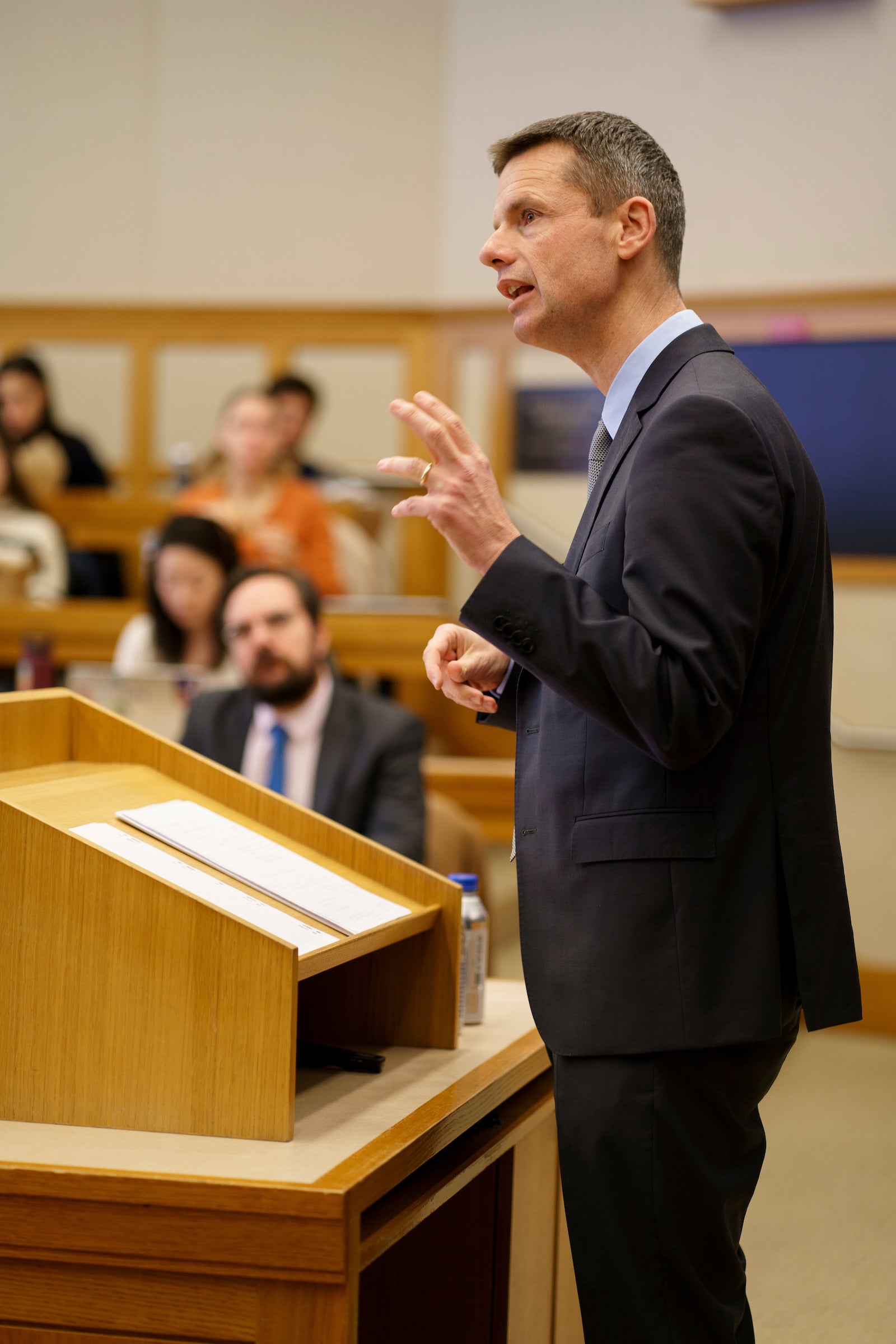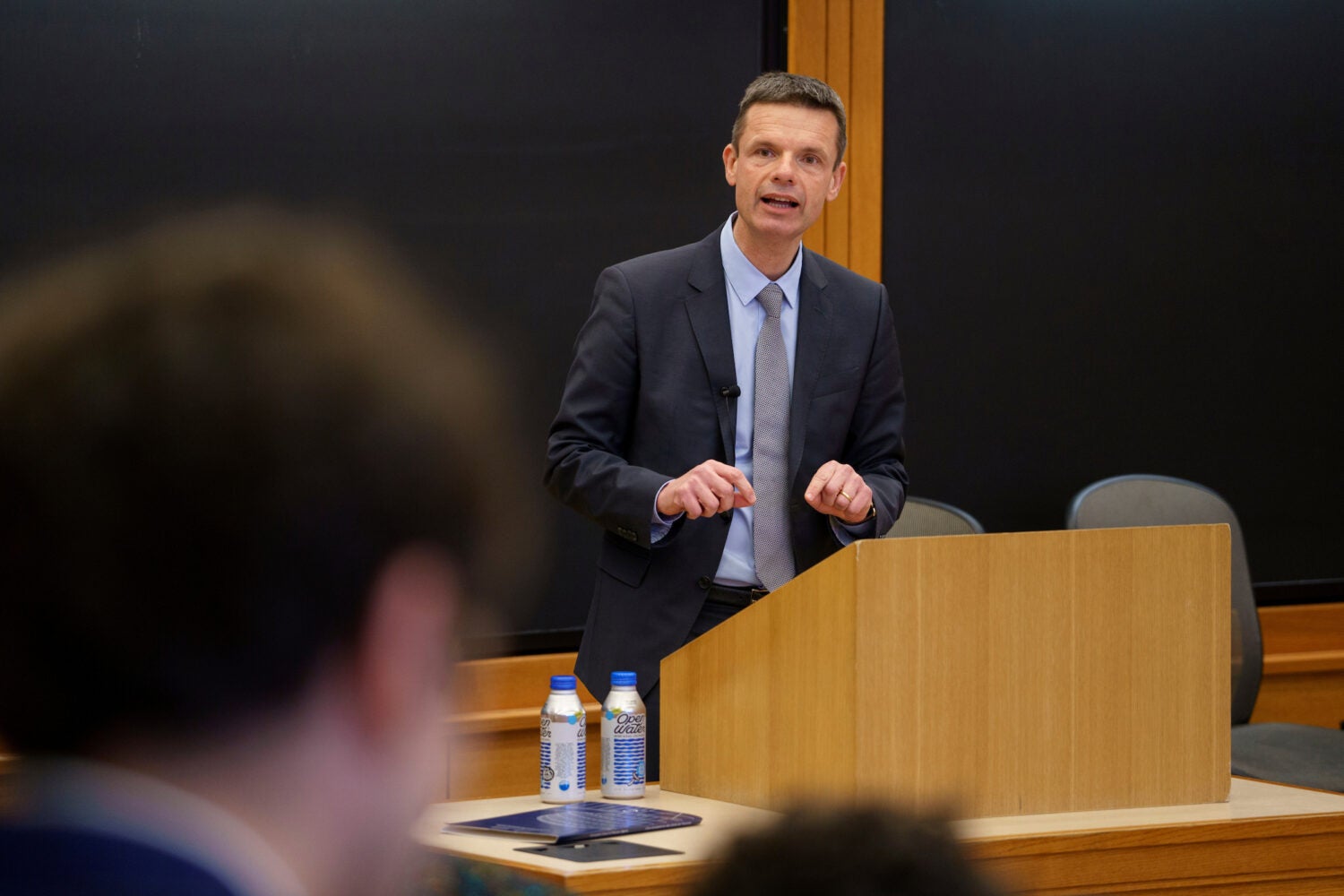A “democratic backslide” is underway in numerous countries, said Marko Bošnjak, president of the European Court of Human Rights, with the principles of democracy, human rights, and the rule of law being undermined by some elected governments. He said it will be largely up to the courts to reverse that trend.
Bošnjak made that point during a talk at Harvard Law School on March 10. The event was co-sponsored by the Harvard Law School Human Rights Program, the Harvard Human Rights Entrepreneurs Clinic, and the Minda de Gunzburg Center for European Studies, and co-hosted by the Harvard European Law Association and the Harvard Human Rights Journal.
Founded in 1959, the European Court of Human Rights, in Strasbourg, France, espouses a democratic philosophy that Bošnjak explained: “We are constantly reiterating that democracy cannot be reduced to the will of the majority. Instead, democracy is marked by pluralism, tolerance, and broad-mindedness, and should thus be subjected to the requirements of the rule of law.”
The European Court, he said, was founded in a spirit of idealism. “There was an obvious optimism and feeling that liberal democracy would prevail and remain until the end of times. There was perhaps a naive vision.” That vision, he said, was challenged by an “antithesis” that started gaining momentum after the 1990s.
“Democratic backsliding is a phenomenon which lacks precise definition. However, there are several elements which are quite descriptive of it,” he said, “the first one being that it is driven by the actions of a democratically elected leader, so it is not by revolutions. Secondly, it is marked not by an abrupt event but by successive reforms reinforcing each other.”
Most of all, he said, backsliding happens when leaders try to reduce the limitations on executive power, which often means putting constraints on the judiciary.
“Usually what the judges hear is that governments are elected by the people, while judges are not. When it comes to an international judiciary, they [the critics] say, ‘You are foreign courts; you interfere with our national policy.’ But even at a national level they say, ‘We have been elected by the people and we need to put their will in motion. Nobody, especially the judiciary, should block us in one way or another’.” Thus, he said, democratic backsliding is “also the rule of law backsliding.”

Hungary, he said, is a country “where observers say that democratic backsliding has advanced a lot.” He cited the case of Baka v. Hungary (2016), in which “the Hungarian government started so-called reform of their Supreme Court. They wanted to dismantle the former court and put in place a new one.” The court’s president, András Baka, was relieved of his position via a new rule that required five years of judicial experience, which he did not have. “He then turned to Strasbourg, claiming violation of various rights, including freedom of expression …” The court ruled in his favor. However, the Hungarian government has not implemented the verdict.
Bošnjak found a more encouraging example in the case of Walesa v. Poland (2023). Lech Walesa, renowned as the leader of Poland’s Solidarity movement, a former president, and a Nobel Peace Prize winner, more recently ran afoul of Poland’s right-leaning government.
“At some point, a proponent of the government accused him of being a spy from the Communist secret service. He started defamation proceedings against that person and won the case, and that judgment became final for a number of years.” The government then put in place a legislative body, the Chamber of Extraordinary Review, that reopened the case and reversed the ruling that had favored Walesa.
“In response to that judgment, we issued a handbook of what went wrong in Polish judicial reforms, and requested that those reforms be dismantled,” Bošnjak said. Some of that happened when a new government took power in December 2023, and the judgment favoring Walesa was restored.
“There are still steps to be done … and it is difficult to dismantle things which go wrong for such a long period of time. But this shows that the grossest of democratic backsliding is not irreversible, and that things can be put back on a positive track, but that the judiciary has a role to play.”
Leading a question-and-answer session afterward, faculty moderator and Visiting Professor of Law Ioannis Kalpouzos noted that Bošnjak had spoken mainly of cases involving separation of powers. He asked whether other factors, notably clampdowns on dissent, might also contribute to democratic backsliding, and whether the court had decided on any relevant cases. In response, Bošnjak cited the case of Russian dissident Alexei Navalny, whose criticism of leader Vladimir Putin led to his imprisonment.
“Unfortunately, he can no longer tell his story,” Bošnjak said, since Navalny died in a Russian prison last year. But Navalny had appeared before the court on a few occasions. “He was singled out by the authorities. They really picked on him and in each case there were repercussions: He was fined, he was beaten, he was detained for some time. And the court found that this was a violation” of the right to freedom of assembly.
Navalny, however, had argued for a more serious charge, that Russia was acting to silence him as the main voice of the political opposition. This required the court to convene a grand jury, something that is done rarely.
“Mr. Navalny came to the court, and he himself pleaded his case, and he was excellent at it. He won his case.” Following Navalny’s death, “The court was even more explicit in a judgment of this year, saying that the Russian government has all the traits of a totalitarian regime. I don’t think we can get in much harder or say it much louder than this.”
Want to stay up to date with Harvard Law Today? Sign up for our weekly newsletter.
